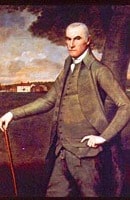William Floyd was born on Long Island on December 17, 1734. His father, Nicoll Floyd, was a landholder, whose ancestors came to America from Wales in 1680, and settled on Long Island. William’s father died when he was young and left him a large estate.
Patriot William Floyd
Because of his wealth and influence, New York appointed Floyd as a delegate to the Continental Congress. He served on several important committees of the Congress, helping to formulate some of the grievances that became a part of the Declaration of Independence. On July 4, 1776, William Floyd gladly signed the Declaration of Independence.
As a result of his revolutionary participation, William Floyd and his family suffered many hardships. While attending Congress in Philadelphia, American troops withdrew from Long Island. British troops then invaded Long Island, forcing Floyd’s family to flee to Connecticut. A British cavalry company occupied their home for the rest of the Revolution.
Political Leader
In 1777, Floyd became a Senator of New York. Under his leadership, he helped to organize the state government and establish its code of laws.
In 1778, he returned to the Continental Congress. During this period, he was instrumental in guiding the Congress in establishing the Articles of Confederation.
Frontiersman
In 1784, Floyd bought an uninhabited tract of land on the Mohawk River. He spent several summers clearing the land until it was a well cultivated farm. In 1803, he moved his family from Long Island to the farm. On August 4, 1821, William Floyd died at the age of 87.
